关于美国文化的英文对话
- 格式:wps
- 大小:15.00 KB
- 文档页数:2
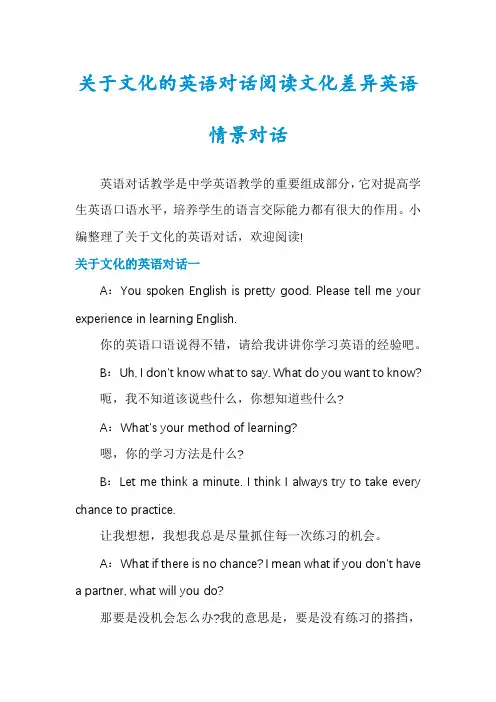
关于文化的英语对话阅读文化差异英语情景对话英语对话教学是中学英语教学的重要组成部分,它对提高学生英语口语水平,培养学生的语言交际能力都有很大的作用。
小编整理了关于文化的英语对话,欢迎阅读!关于文化的英语对话一A:You spoken English is pretty good. Please tell me your experience in learning English.你的英语口语说得不错,请给我讲讲你学习英语的经验吧。
B:Uh, I don't know what to say. What do you want to know?呃,我不知道该说些什么,你想知道些什么?A:What's your method of learning?嗯,你的学习方法是什么?B:Let me think a minute. I think I always try to take every chance to practice.让我想想,我想我总是尽量抓住每一次练习的机会。
A:What if there is no chance? I mean what if you don't have a partner, what will you do?那要是没机会怎么办?我的意思是,要是没有练习的搭挡,你会怎么做?B:Well, I talk to myself. That is, I play one role first, than the other.嗯,我和自己说话,也就是说,我先扮演一个角色,然后再扮演另外一个角色。
A:That's a good idea. You are really creative.这个主意不错!你还真有创意。
关于文化的英语对话二A:Eric, how long will you be in China?Eric,你要在中国呆多久?B:I don't know. Well, my contract here is for one year, andI don't know what I should do after that. Maybe going around fora while.不知道,我在这里的合同是一年的,我也不知道之后该干点什么,也许会四处走走。
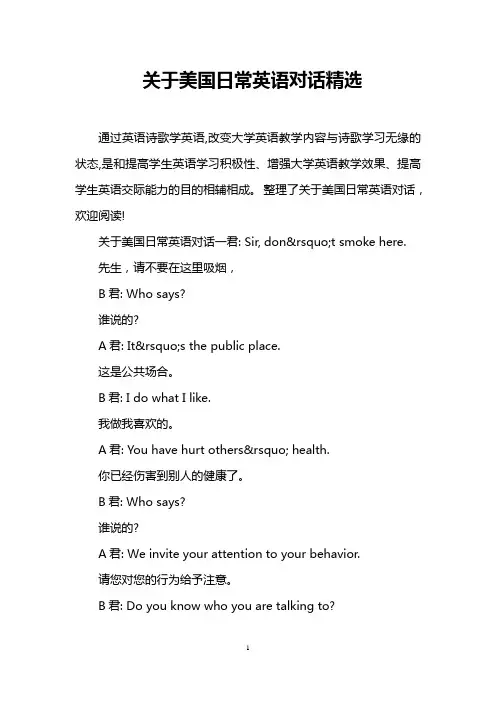
关于美国日常英语对话精选通过英语诗歌学英语,改变大学英语教学内容与诗歌学习无缘的状态,是和提高学生英语学习积极性、增强大学英语教学效果、提高学生英语交际能力的目的相辅相成。
整理了关于美国日常英语对话,欢迎阅读!关于美国日常英语对话一君: Sir, don’t smoke here.先生,请不要在这里吸烟,B君: Who says?谁说的?A君: It’s the public place.这是公共场合。
B君: I do what I like.我做我喜欢的。
A君: You have hurt others’ health.你已经伤害到别人的健康了。
B君: Who says?谁说的?A君: We invite your attention to your behavior.请您对您的行为给予注意。
B君: Do you know who you are talking to?你知道你在和谁说话吗?A君: I don’t know, but please put out your cigar.我不知道,但是请熄掉你的烟。
B君: Fine. Wait and see.好,等着瞧。
关于美国日常英语对话二Ann: Hello!你好。
Lily: Hello!你好。
Ann: Long time no see.好久不见啊。
Lily: Yes, these days, I am very busy.是啊,这几天很忙啊。
Ann: What’s up?什么事呢?Lily: The Spring Festival is on the way, and my house is out of order.春节快到了,我家太乱了。
Ann: I like doing sweeping.我喜欢做大扫除。
Lily: Yes, I always can find something I missed.是的,我总是能找到一些我丢了的东西。
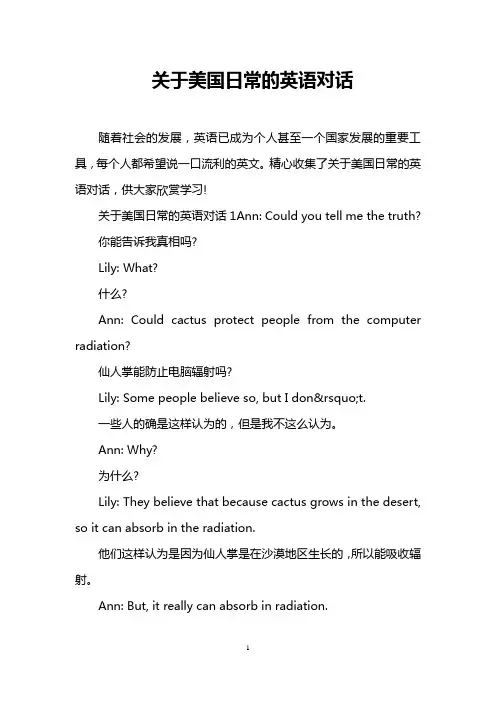
关于美国日常的英语对话随着社会的发展,英语已成为个人甚至一个国家发展的重要工具,每个人都希望说一口流利的英文。
精心收集了关于美国日常的英语对话,供大家欣赏学习!关于美国日常的英语对话1Ann: Could you tell me the truth?你能告诉我真相吗?Lily: What?什么?Ann: Could cactus protect people from the computer radiation?仙人掌能防止电脑辐射吗?Lily: Some people believe so, but I don’t.一些人的确是这样认为的,但是我不这么认为。
Ann: Why?为什么?Lily: They believe that because cactus grows in the desert, so it can absorb in the radiation.他们这样认为是因为仙人掌是在沙漠地区生长的,所以能吸收辐射。
Ann: But, it really can absorb in radiation.但是,它真的能吸收辐射啊。
Lily: No, I mean that the radiation is computer radiation. It’s different.不,我说的这个辐射是指电脑辐射。
不一样的。
Ann: Oh, I see. I do something in vain.哦,我明白了,我白做工了。
Lily: I think so.的确。
关于美国日常的英语对话2Ann: It’s time for us to prepare to school.是时候准备回学校了。
Lily: That’s right.是的。
Ann: When do you go back?你什么时候回去。
Lily: Maybe tow days latter.可能是两天后吧。
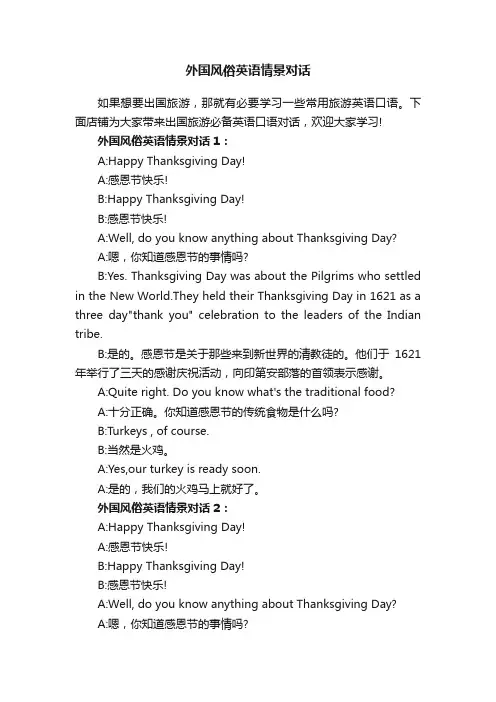
外国风俗英语情景对话如果想要出国旅游,那就有必要学习一些常用旅游英语口语。
下面店铺为大家带来出国旅游必备英语口语对话,欢迎大家学习!外国风俗英语情景对话1:A:Happy Thanksgiving Day!A:感恩节快乐!B:Happy Thanksgiving Day!B:感恩节快乐!A:Well, do you know anything about Thanksgiving Day?A:嗯,你知道感恩节的事情吗?B:Yes. Thanksgiving Day was about the Pilgrims who settled in the New World.They held their Thanksgiving Day in 1621 as a three day"thank you" celebration to the leaders of the Indian tribe.B:是的。
感恩节是关于那些来到新世界的清教徒的。
他们于1621年举行了三天的感谢庆祝活动,向印第安部落的首领表示感谢。
A:Quite right. Do you know what's the traditional food?A:十分正确。
你知道感恩节的传统食物是什么吗?B:Turkeys , of course.B:当然是火鸡。
A:Yes,our turkey is ready soon.A:是的,我们的火鸡马上就好了。
外国风俗英语情景对话2:A:Happy Thanksgiving Day!A:感恩节快乐!B:Happy Thanksgiving Day!B:感恩节快乐!A:Well, do you know anything about Thanksgiving Day?A:嗯,你知道感恩节的事情吗?B:Yes. Thanksgiving Day was about the Pilgrims who settled in the New World.They held their Thanksgiving Day in 1621 as a three day"thank you" celebration to the leaders of the Indian tribe.B:是的。
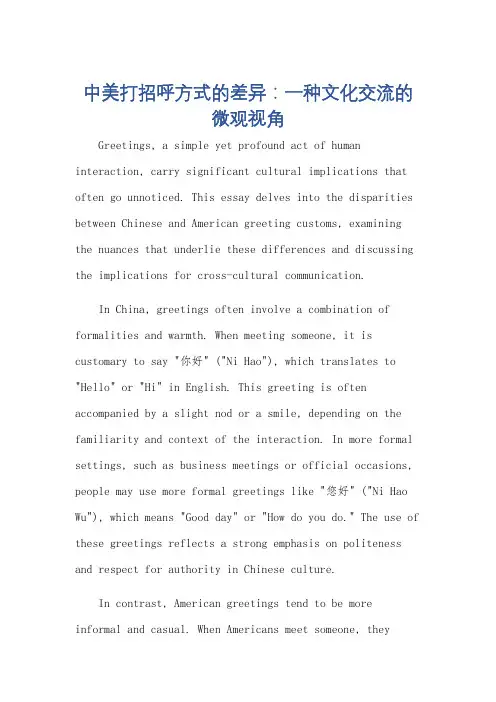
中美打招呼方式的差异:一种文化交流的微观视角Greetings, a simple yet profound act of human interaction, carry significant cultural implications that often go unnoticed. This essay delves into the disparities between Chinese and American greeting customs, examining the nuances that underlie these differences and discussing the implications for cross-cultural communication.In China, greetings often involve a combination of formalities and warmth. When meeting someone, it is customary to say "你好" ("Ni Hao"), which translates to "Hello" or "Hi" in English. This greeting is often accompanied by a slight nod or a smile, depending on the familiarity and context of the interaction. In more formal settings, such as business meetings or official occasions, people may use more formal greetings like "您好" ("Ni Hao Wu"), which means "Good day" or "How do you do." The use of these greetings reflects a strong emphasis on politeness and respect for authority in Chinese culture.In contrast, American greetings tend to be more informal and casual. When Americans meet someone, theyoften use "Hi" or "Hello," which are relatively neutral greetings. In more familiar settings, they might use "How are you?" or "What's up?" as a way of acknowledging someone's presence and initiating conversation. These greetings reflect a culture that values informality and friendliness, encouraging a more relaxed and informal approach to social interaction.The differences in greeting customs between China and the United States can be traced to their respectivecultural values and social norms. Chinese culture, with its deep-rooted Confucian traditions, emphasizes harmony, respect, and hierarchy. This is reflected in greeting customs, where politeness and deference to authority are highly valued. On the other hand, American culture, influenced by its libertarian values and individualistic orientation, encourages a more informal and egalitarian approach to social interaction.These cultural differences can sometimes lead to misunderstandings and awkward situations in cross-cultural communication. For example, an American who uses a casual greeting like "What's up?" might be perceived as beingdisrespectful or informal in a Chinese context, where a more polite and formal greeting is expected. Conversely, a Chinese person who uses a very formal greeting in an American setting might be perceived as being toostandoffish or unfriendly.To overcome these barriers and facilitate effective cross-cultural communication, it is important to have an open and包容的态度 towards cultural differences. It is essential to understand and respect the greeting customs of other cultures, adapting one's own behavior accordingly. By doing so, we can establish stronger and more meaningful connections with people from different cultures, promoting mutual understanding and harmony.In conclusion, the differences in greeting customs between China and the United States reflect the unique values and norms of their respective cultures. Understanding these differences and adapting our greeting behavior accordingly is crucial for effective cross-cultural communication. By embracing cultural diversity and fostering mutual respect, we can create a more inclusive and connected world.**中美打招呼方式的差异:一种文化交流的微观视角** 问候,这一简单却深刻的人类交互行为,蕴含着重要的文化意蕴,这些意蕴往往被忽视。
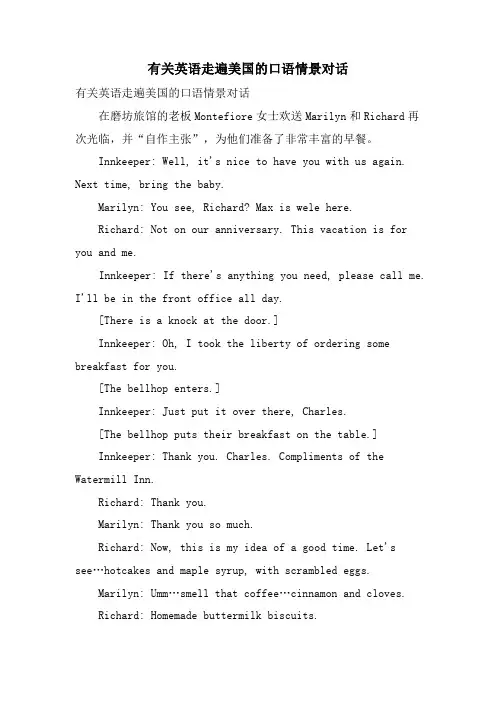
有关英语走遍美国的口语情景对话有关英语走遍美国的口语情景对话在磨坊旅馆的老板Montefiore女士欢送Marilyn和Richard再次光临,并“自作主张”,为他们准备了非常丰富的早餐。
Innkeeper: Well, it's nice to have you with us again. Next time, bring the baby.Marilyn: You see, Richard? Max is wele here.Richard: Not on our anniversary. This vacation is for you and me.Innkeeper: If there's anything you need, please call me. I'll be in the front office all day.[There is a knock at the door.]Innkeeper: Oh, I took the liberty of ordering some breakfast for you.[The bellhop enters.]Innkeeper: Just put it over there, Charles.[The bellhop puts their breakfast on the table.]Innkeeper: Thank you. Charles. Compliments of the Watermill Inn.Richard: Thank you.Marilyn: Thank you so much.Richard: Now, this is my idea of a good time. Let's see…hotcakes and maple syrup, with scrambled eggs.Marilyn: Umm…smell that coffee…cinnamon and cloves.Richard: Homemade buttermilk biscuits.Marilyn: Slices of orange with burnt honey.1. This vacation is for you and me.这次休假是专为你我二人的。
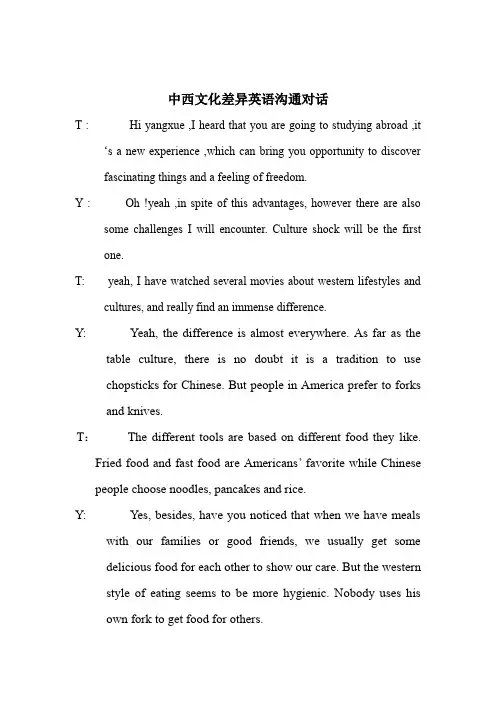
中西文化差异英语沟通对话T : Hi yangxue ,I heard that you are going to studying abroad ,it ‘s a new experience ,which can bring you opportunity to discover fascinating things and a feeling of freedom.Y : Oh !yeah ,in spite of this advantages, however there are also some challenges I will encounter. Culture shock will be the first one.T: yeah, I have watched several movies about western lifestyles and cultures, and really find an immense difference.Y: Yeah, the difference is almost everywhere. As far as the table culture, there is no doubt it is a tradition to use chopsticks for Chinese. But people in America prefer to forks and knives.T:The different tools are based on different food they like.Fried food and fast food are Americans’ favorite while Chinese people choose noodles, pancakes and rice.Y: Yes, besides, have you noticed that when we have meals with our families or good friends, we usually get some delicious food for each other to show our care. But the western style of eating seems to be more hygienic. Nobody uses his own fork to get food for others.T:Yeah, quite so. This is only table manners. I also know that greeting is different. In China, when I meet you in the street, I may greet you by saying “Have you eaten yet?” And what will be your reflect?Y: Oh, I will feel normal. Pretty normal greeting words.T:But if you greet a foreigner with these words. They will believe that you want to invite him to a meal.Y: Really? Too interesting.T:So it’s easy to lead to misunderstanding because of different cultures. Of course, the situations are more serious if you greet someone in western countries by saying “What are you going to do?” “Where have you been?” etc. Because they think you have infringed their privacy. Thus,you can imagine their greetings, they usually greet each other “Good morning/evening/afternoon. “Fine day, isn’t it? ”Y: But don’t you feel these are too formulaic or unnecessary?T:Yes, but that’s only our thinking.Y: Just now, you referred to personal affairs ,there is also many different opinions here. For example, we do not regard it as asking personal affairs when they ask others name、year、marital status、wages、personal life、belief and political points.T:Yes, we regard it as concerns.Y: But the westerns will think you infringe their right of privacy. So when we talk to the westerns, we must avoid asking some questions like this:“ How old are you?”、“Are you married?”、“How many children do you have?”、“How much do you make?”、“What’s your weight?”、“Do you go to the church?”T:So many details need to notice. We have talked so much, but it only covers several small aspects in life. I even feel the way of life in America is completely different from mine. I think I will be mad facing all these. Now that you will go there. Have you consider how to adjust yourself to adapt their cultures?Y: In fact, I have considered the problem for long time. At least four essential stages of adjustment occur during culture shock to new arrivals. I will keep positive to overcome these. As we know , Americans are slaves to nothing but clocks ,they work hard at the task of saving time . I must get rid of the habit of delaying time to keep pace with them. It’s huge project.T:Yeah, yeah. You should establish a right attitude toward culture differences, to be open-minded to them. After all, attitude can decide one’s feeling and behaving. However, these seem not to be enough. Y: That’s true. I also need to learn about their cultural background before I go. And I have read some books and gradually accept their ways of life. Next, I am going to read their newspapers andmagazines and some literature works to learn the country deeply. T:Yeah, your decision is right and it will benefit you. You would learn so much and you will respect their culture from your deep heart. Thus, you can adapt to the life there more quickly and suffer from little culture shock.Y: I think so too. At least, I can avoid unintentionally offending others and make less jokes.T:Of course, I believe your ability.。
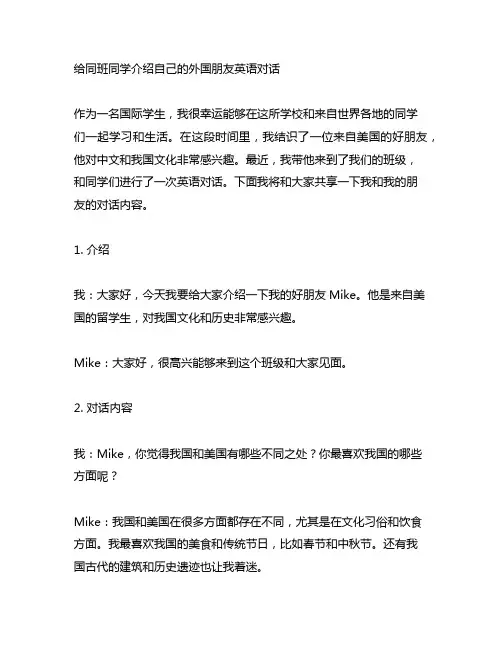
给同班同学介绍自己的外国朋友英语对话作为一名国际学生,我很幸运能够在这所学校和来自世界各地的同学们一起学习和生活。
在这段时间里,我结识了一位来自美国的好朋友,他对中文和我国文化非常感兴趣。
最近,我带他来到了我们的班级,和同学们进行了一次英语对话。
下面我将和大家共享一下我和我的朋友的对话内容。
1. 介绍我:大家好,今天我要给大家介绍一下我的好朋友Mike。
他是来自美国的留学生,对我国文化和历史非常感兴趣。
Mike:大家好,很高兴能够来到这个班级和大家见面。
2. 对话内容我:Mike,你觉得我国和美国有哪些不同之处?你最喜欢我国的哪些方面呢?Mike:我国和美国在很多方面都存在不同,尤其是在文化习俗和饮食方面。
我最喜欢我国的美食和传统节日,比如春节和中秋节。
还有我国古代的建筑和历史遗迹也让我着迷。
我:你对我国的语言有没有兴趣呢?在学习中文的过程中,你觉得有哪些难点?Mike:我对中文也非常感兴趣,我觉得中文是一门非常美丽和有趣的语言。
不过,在学习中文的过程中,发音和汉字的书写是我觉得最难的部分。
3. 结论通过和Mike的对话,我感觉到我对我国文化和语言的了解更加丰富了。
在和国际朋友交流的过程中,我也从中学到了很多新的知识。
希望我们班级的同学们也能和国际朋友多多交流,共同学习,共同进步。
个人观点和理解在和Mike的对话中,我深刻地感受到了跨文化交流的重要性。
通过和外国朋友的交流,我不仅开阔了眼界,也让我更加自信地表达自己。
我相信只有在和不同文化背景的人交流中,我们才能更好地了解自己,发现自己的不足之处,并不断提高自己。
在这次和Mike的对话中,我也更加深刻地认识到了中文的魅力。
尽管中文的发音和汉字书写对外国人来说可能有些困难,但正是这种独特的魅力,吸引着越来越多的外国人学习中文,了解我国文化。
总结通过和Mike的对话,我不仅更加深入地了解了我国文化和语言,也让我更加自信地展现了自己的文化。
我希望未来能够有更多的机会和国际朋友进行交流,共同学习,共同进步。
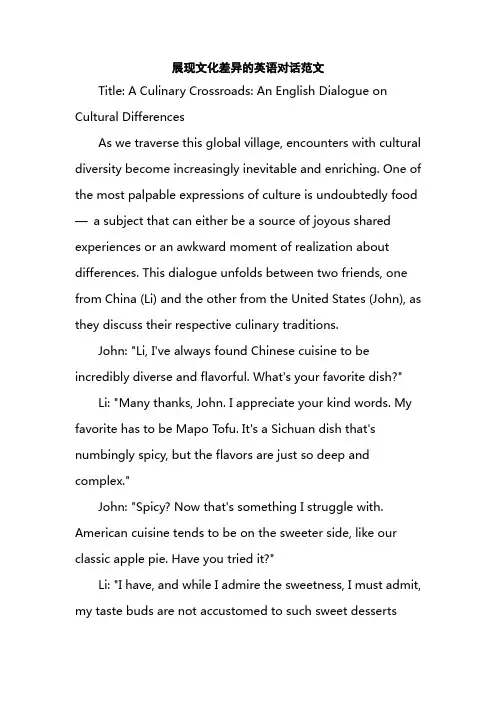
展现文化差异的英语对话范文Title: A Culinary Crossroads: An English Dialogue on Cultural DifferencesAs we traverse this global village, encounters with cultural diversity become increasingly inevitable and enriching. One of the most palpable expressions of culture is undoubtedly food —a subject that can either be a source of joyous shared experiences or an awkward moment of realization about differences. This dialogue unfolds between two friends, one from China (Li) and the other from the United States (John), as they discuss their respective culinary traditions.John: "Li, I've always found Chinese cuisine to be incredibly diverse and flavorful. What's your favorite dish?"Li: "Many thanks, John. I appreciate your kind words. My favorite has to be Mapo Tofu. It's a Sichuan dish that's numbingly spicy, but the flavors are just so deep and complex."John: "Spicy? Now that's something I struggle with. American cuisine tends to be on the sweeter side, like our classic apple pie. Have you tried it?"Li: "I have, and while I admire the sweetness, I must admit, my taste buds are not accustomed to such sweet dessertsafter a meal."John: "Fair enough. And speaking of meals, did you know the typical American diet consists of a lot of beef? We love our steaks."Li: "Funny you should mention beef. In China, we traditionally save certain dishes, like red-braised beef, for special occasions. It's a matter of respect and tradition."John: "That's fascinating. Here, beef is quite common, especially in the Midwest, where I'm from. But I do try to respect the traditions of other cultures when I can. Speaking of which, have you ever had a traditional Thanksgiving dinner?"Li: "No, I haven't. Is it very different from our Mooncake Festival?"John: "It is, actually. Thanksgiving is a time when families come together to express gratitude for the year's blessings by sharing a huge meal, often with turkey as the centerpiece."Li: "That sounds lovely. Our Mooncake Festival involves sharing mooncakes and admiring the full moon, symbolizing unity. Both seem to celebrate family and togetherness."John: "Indeed, they do. It's these kinds of similarities that make me think that despite our cultural differences, we're not so different after all."Li: "I could not agree more, John. Food truly is a universal language that speaks to our common humanity."This dialogue underscores the essence of cultural differences, highlighting how two individuals from disparate backgrounds can find points of mutual appreciation and understanding through their discussions on food. As Li and John continue to share their experiences and insights, they build a bridge of friendship and cultural awareness, demonstrating that differences are not barriers but gateways to a richer, more vibrant world.。
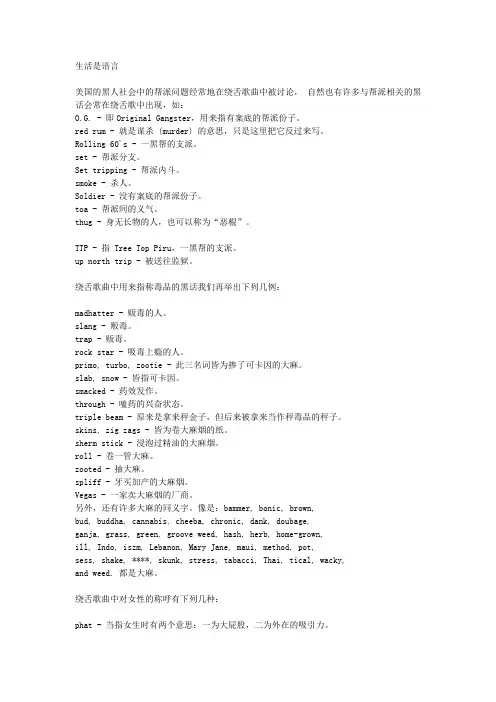
生活是语言美国的黑人社会中的帮派问题经常地在绕舌歌曲中被讨论,自然也有许多与帮派相关的黑话会常在绕舌歌中出现,如:O.G. - 即Original Gangster,用来指有案底的帮派份子。
red rum - 就是谋杀 (murder) 的意思,只是这里把它反过来写。
Rolling 60's - 一黑帮的支派。
set - 帮派分支。
Set tripping - 帮派内斗。
smoke - 杀人。
Soldier - 没有案底的帮派份子。
toa - 帮派间的义气。
thug - 身无长物的人,也可以称为“恶棍”。
TTP - 指 Tree Top Piru,一黑帮的支派。
up north trip - 被送往监狱。
绕舌歌曲中用来指称毒品的黑话我们再举出下列几例:madhatter - 贩毒的人。
slang - 贩毒。
trap - 贩毒。
rock star - 吸毒上瘾的人。
primo, turbo, zootie - 此三名词皆为掺了可卡因的大麻。
slab, snow - 皆指可卡因。
smacked - 药效发作。
through - 嗑药的兴奋状态。
triple beam - 原来是拿来秤金子,但后来被拿来当作秤毒品的秤子。
skins, zig zags - 皆为卷大麻烟的纸。
sherm stick - 浸泡过精油的大麻烟。
roll - 卷一管大麻。
zooted - 抽大麻。
spliff - 牙买加产的大麻烟。
Vegas - 一家卖大麻烟的厂商。
另外,还有许多大麻的同义字。
像是:bammer, bonic, brown,bud, buddha, cannabis, cheeba, chronic, dank, doubage,ganja, grass, green, groove weed, hash, herb, home-grown,ill, Indo, iszm, Lebanon, Mary Jane, maui, method, pot,sess, shake, ****, skunk, stress, tabacci, Thai, tical, wacky,and weed. 都是大麻。
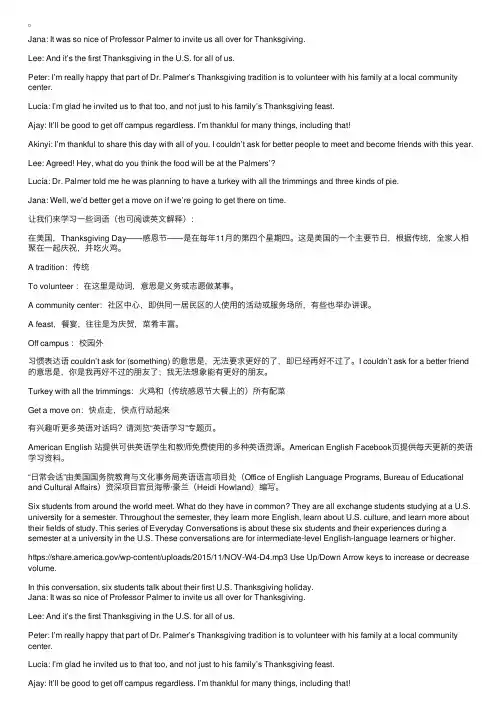
Jana: It was so nice of Professor Palmer to invite us all over for Thanksgiving.Lee: And it’s the first Thanksgiving in the U.S. for all of us.Peter: I’m really happy that part of Dr. Palmer’s Thanksgiving tradition is to volunteer with his family at a local community center.Lucía: I’m glad he invited us to that too, and not just to his family’s Thanksgiving feast.Ajay: It’ll be good to get off campus regardless. I’m thankful for many things, including that!Akinyi: I’m thankful to share this day with all of you. I couldn’t ask for better people to meet and become friends with this year. Lee: Agreed! Hey, what do you think the food will be at the Palmers’?Lucía: Dr. Palmer told me he was planning to have a turkey with all the trimmings and three kinds of pie.Jana: Well, we’d better get a move on if we’re going to get there on time.让我们来学习⼀些词语(也可阅读英⽂解释):在美国,Thanksgiving Day——感恩节——是在每年11⽉的第四个星期四。
关于文化差异的英语对话情景练习文化差异即是指因地区异同,各地区人们所特有的文化异同而产生的差异。
今天店铺精心收集了关于文化差异的英语对话给大家,希望对大家有所帮助!关于文化差异的英语对话1Boast cross-talkFirst: Our family boasts in old and well-known families!Second: Our family is boasting in the specialized household!First: Our boast of home does not pay taxes.Second: We do not hand in the money in boast of home!First: Not blowing, I will go to toilet once borning.Second: Crawling?First: Who is it climb to come down while being harsh?Second: How will that go?First: The bed acts as the lavatory!Second: These is it wet the bed to ask!First: I can run in three months.Second: That must be a monster!First: I of on the month such as three pieces mother go to work,I has to grandmother house /run grandmother house both ends.Second: Run in this way!First: It want say boast, I no one can than.Second: I it believe,it dare you not here than than?First: Blow here? No problem!Second: Is it say heavy appetite this to want, I first meal can take five bowls of noodles!First: Can eat 4 kilograms of boiled meat dumpling in a meal of mine!Second: Oh, I have a fever!First: Oh, I have a fever too!Second: I am covering a bed of quilts to sleep in the evening, saw suddenly the next day, the quilt burnt a large hole!First: Slept in the eveninging, I held a handful of maize in the hand, saw suddenly the next day, became puffed rice completely!Second: I am taller than the tree!First: I am higher than the floor!Second: Unless I top of the head it, ride,stretch out one's hand not can stressing by plane not big!First: My upper lip is carrying it, the lower lip is carrying the ground!Second: Then how about your face?First: The person boasting is shameless!Second: Hey! -----关于文化差异的英语对话2Joel: So, Michele, how long have you been living in Japan?Michele: Well, in total it's been almost four years now.Joel: Four years. OK. That's about the same for me too.Michele: Oh, yeah.Joel: Do you feel like your totally used to it? Are you acculturated?Michele: I think so. At times there are still some things that are a little bit difficult but for the most part, I don't have a culture shock anymore.Joel: For example?Michele: Something that I still struggle with?Joel: Yes.Michele: Well, there's still the language barrier because I'm still not fluent in Japanese so, like today I went to the bank and Iwas trying to do something that was a little out of the ordinary I guess I just had some trouble and I couldn't get it done.Joel: And you said you had gone back to the United States...Michele: Canada.Joel: I'm sorry. You had gone back to Canada and did you have kind of reverse culture shock when you went back?Michele: Yes, I did actually. I... at that time, I had lived in Japan for about three years and I returned to Canada and I was so used to living in Japan and I guess I had to change my thinking and behaviors a little bit while I was in Japan so when I went back to Canada I felt like, "OK, now I have to change back."Joel: The first thing I noticed when I had gone back to the United States was in the grocery store, the supermarket, when I was buying my food the cashier would talk to me and ask me questions.Michele: Right.Joel: And when I lived in Asia, the cashiers, they never talk to you, and it just threw me off. It threw me off guard. I was very surprised at how much just people you don't know will approach you and talk to you and ask you questions.Michele: Right.Joel: Is it the same in Canada?Michele: Yeah. Yeah. I think so. And I also noticed when I went back to Canada, especially I lived near Toronto, and there's people from a lot of different countries in Toronto, I've been soused to seeing only Japanese pieces, so it was a little bit shock to see so many different pieces again whenever I back to Canada.Joel: And also, you're planning to move back soon again?Michele: Well, I'm going to go back Canada in the summer for my holidays but then I'll be back in Japan.Joel: Oh, I see. What do you think you'll miss most while you're gone?Michele: What will I miss about Japan?Joel: Yeah.Michele: I think I'll miss the food the most. I really love Japanese food.Joel: That's exactly the same for me.Michele: Yeah.Joel: I'll miss my yakisoba.Michele: And good sushi. Udon. I love udon.关于文化差异的英语对话3Bill: Hi Tony. How're you doing?Tony: Fine. Just got back from visiting the home of one of my Chinese colleagues.Bill: Oh, have a good time?Tony: Oh yes, very good. Mind you, I was bit hurt about the way they treated my present. You see, I know they like Western music so I brought them back some of the latest tapes from the UK. Had them all wrapped up beautifully and gave them to them as soon as I got inside the door and what do you think happened?Bill: What?Tony: Nothing. Well, more or less. They said thank you but then just put them away in a corner. Didn't even bother to unwrap them. I must say I felt a bit miffed after all the trouble I'd taken.。
一.Listening Comprehension (1*10=10)【1个对话,2篇段落】二.Multiple choice (1*20=20)【单元测试中1-8单元的选择题】三.Term Explanation (5*4=20)1.Blended Family 7Blended family is one type of the American family stuctures.This is a family chooses in which two persons remarry . These two persons both once got divorced ,but have children. In the new family ,they make both groups of children live together.2.The Great Depression 2During most of the 1920s,the Unite States enjoyed a period of unbalanced prosperity.①The boom was fueled by an inflated stock market, which later led to a crash on October 29, 1929.②This, along with many other economic factors, triggered a world-wide depression known as the Great Depression. During this time, the United States experienced deflation, unemployment increased from 3% in 1929 to 25% in 1933, and manufacturing output collapsed by one-third.3.Mother's Day 4①The modern Mother's Day as celebrated in the US holiday as a day to honor mothers and motherhood; especially within the context of families, and family relationships.②It is now celebrated on various days in many parts of the world. The United States celebrates Mother's Day on the second Sunday in May.③The holiday was created by Anna Jarvis in Grafton, West Virginia, in 1908 as a day to honor one's mother.4.The lvy league 5①The Ivy League is an athletic conference comprising 8 private institutions of higher education such as Harvard University , Yale University and so on in the Northeastern United States.②In addition, Ivy League schools are often viewed by the public as some of the most prestigious universities worldwide and are often ranked amongst the best universities in the United States and worldwide.75.Affirmative Action is a policy or program intended to promote access to education Affirmative action①or employment for minority groups and women.past of redress the effects affirmative action policies is to ②Motivation for discrimination and to encourage public institutions such as universities, hospitals, and police forces to be more representative of the population.36.The Bill of RightsThe Constitution has twenty-seven amendments. The first ten, collectively known ①, were ratified simultaneously by 1791. The following seventeen Bill of Rights as the were ratified separately over the next two centuries.They were introduced by Jame Madison and Thomas Jefferson was a supporter of ②the bill of rights.of press, Freedom of freedom of speech, the ③For example , First Amendment–from Protection Third Amendment–Religion, and of assembly; right to petition.. quartering of troops.7.April Fool's Day 4①April Fool's Day is a day celebrated in many countries on April 1.②The day is marked by the commission of hoaxes and other practical jokes of varying sophistication on friends,family members,enemies,and neighbors.③April Fool's Day thus developed into an international fun fest, so to speak, with different nationalities specializing in their own brand of humor at the expense of their friends and families.8.SAT 5①Scholastic Assessment Test and Scholastic Aptitude Test②The SAT and ACT are the most common standardized tests that students take when applying to college.③Most competitive schools also require two or three SAT Subject Tests, (formerly known as SAT IIs), which are shorter exams that focus strictly on a particular subject matter.④Possible scores range from 600 to 2400, combining test results from threewriting .critical reading and 800-point sections . Including math四.True or False (1*10=10)【教学课件中的内容】五.Questions (10*2=20)1.What are the advantages and disadvantages of jury system(陪审团制度) in the Judicial System(司法系统) of the United States?3Advantages:Firstly, it is formed by ordinary people who have different kinds of jobs. Secondly , it is democratic . Thirdly , it help to enhance the credibility of the trial(提高审判公信力. Fourthly , it has law-making function(造法功能). The last , it also has educational function(教育功能)Disadvantages:Firstly,most members of the jury do not have the legal expertise(缺乏法律专业知识). What's more, if the Government cannot protect the jury well , the situation that thejury is being bought off or being threatened will be frequently happen. This will enable the upper social strata to have a good umbrella.(如果政府对陪审团保护不利的情况下,很容易发生陪审团被买通被威胁的事件,这样使社会上层人士有个很好的保护伞。
American Culture
F:Good morning ,W. Do you know American culture?
M:En,I know you're good for it,Would you like to talk something
with me?
F:All right. As we know,America is a young country, however, its
culture is quite splendid , which is admitted by people all over the
world.
M:Oh! especially its fast food culture.I often have lunch in KFC
with my friends.
F:Ok. And America culture isn't only famous for fast food ,but it has
more advantages that a lot of countries would like to learn in the
world. The first is originality.
W:Yeah,American write originality in theirs education.They think it
could raise strength by invention.So imagination of American is
rich.And the education of China is improving because of it.
F:En,you are right. I think the next one is competitiveness ,they
usually compete to time everyday.you can learn something in theirs
sport,music or movie.It's why America has a fervor heart.
W:haha,you know I like playing basketball best ,so I know I will be
more healthy than before if I insist on it......En,I think justice is an
important part in American culture when you talk about sport.
F:Yes,Although there are less laws than any other country,American
still protect theirs laws carefully.We need learn how can they get
such an awareness of the law.
W:In my opinion,the reason why the American culture is so popular
owes to people's fast rhythm of life,and Americans are always
seeking for the high efficiency no matter in their work or life.
F:Er...It's seems that you know more than me!
W:ha!you are really modest,Let's have a lunch.
F:all right.